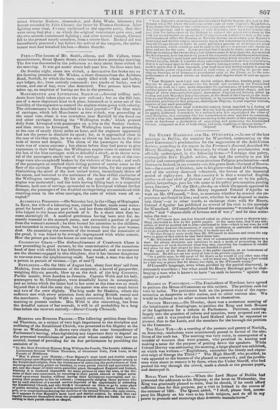SIR. HENRY IIARDINOE AND MR. O'C oNNEL t One Of
the late meetings in Dublizi, the member for Waterford, commenting on the Lord Lieutenant's proclamation for the suppression of the Anti-Union Society, according to the report in the Freeman's Journal, described Sir Henry Hardinge, the Irish Secretary, by whom the proclamation was officially undersigned, in the following terms—" I arraign that paltry, contemptible little English soldier, that had the audacity to put his pitiful and contemptible name to an atrocious Polignac proclamation—and that too in Ireland, in my country—in this green land—the land of Brown- low—the country of Grattan now in his grave—the land of Charlemont, and of the seventy thousand volunteers, the heroes of the immortal period of eighty-two. In that country it is that a wretched English scribe—a chance child of fortune and of war—urged on by his paltry, lawyerlings, puts his vile name to his paltry proclamation putting down freemen." On the 23rd—the day on which the speech appeared in the Freeman's Journal—Sir Henry requested Colonel d'Aguilar to wait on Mr. O'Connell, "first, to ascertain whether he avowed the et- pressions attributed to him; and next, whether he was disposed to maine min them",—or in other words, to exchange shots with Sir Henry. Colonel d'Agullar has published an avowal of his visit to the member for Waterford. O'Connell disclaimed the expressions "wretched English scribe" and "chance child of fortune and of war ;" and he thus main-
tains the rest —
"iStr. O'Cannell does not feel himself called on either to avow or disavow any- thing attributed to him by the public papers. At the same time, that if any alle- gation of fact be pointed out to him—attributed to him—which is not true, he wilt readily either disavow the assertion, if untruly attributed, or contradict and atm: in every possible way for the allegation, if he made use of it. " No man living is more ready than Mr. O'Connell to disavow and atone for any error in point of fact which he may have fallen into. " Mr. O'Connell will not receive any kind of communication with reference to-a duel. He utterly disclaims any reference to such a mode of proceeding, be 54e consequences of such disclaimer what they niay, repeating his readiness to retratt and atone for any fact alleged by him not founded in proof. " He spoke of Sir Henry Hardinge in his public capacity, as an instrument of despotism. He did not say one word of him in his private capacity.
" As a public man. he did speak of Sir Henry as he would of any other man who trampled on the liberties of Irishmen ; and be must say, that fighting a duel would be a bad way to prove that Sir Henry was right, or Sir. O'Connell wrong." O'ConnelPs language, even when purified by the partial disavowal, is extremely scurrilous ; but what could Sir Henry Hardinge gain by chal- lenging a man who is knowq to have "an oath in heaven" against the appeal to pistols ?


























 Previous page
Previous page